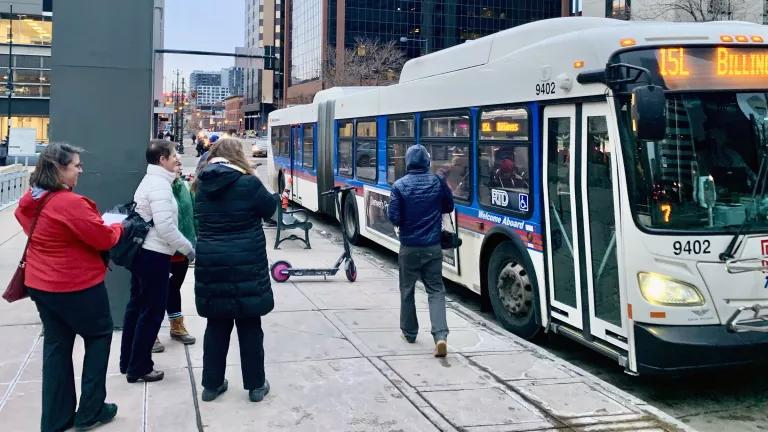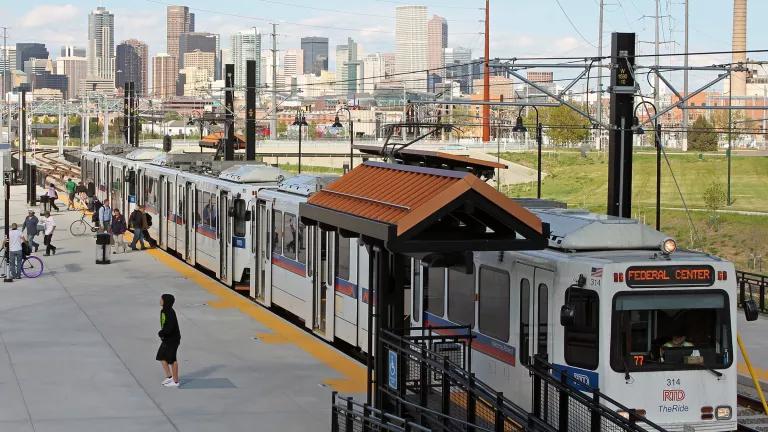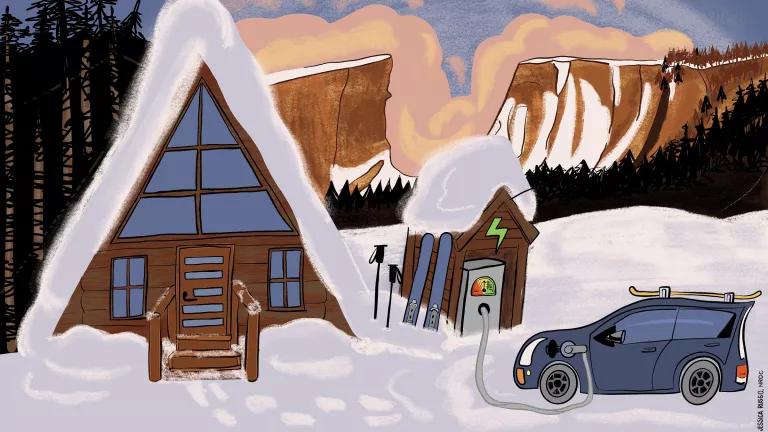Colorado Lawmakers Must Approve Landmark Proposal to Fund Public Transit
SB24-230 offers a tremendous opportunity to fund transit service through a fee on oil and gas production in Colorado—linking a key source of climate and ozone pollution with a key solution.

Riders wait for an RTD bus in Denver. Newly introduced legislation would improve transit service and frequency.
Alana Miller
Imagine clearer skies across Colorado and buses and trains that arrive frequently, run all day, and get you out of traffic and on your way. That reality is within reach if the legislature passes SB24-230, which proposes a fee on oil and gas production to fund public transit service—linking a key source of climate and ozone pollution with a key solution.
As Colorado’s 2024 legislative session approaches its final week, lawmakers are presented with a tremendous opportunity to fight climate change and ozone pollution by passing SB24-230 to invest millions of dollars each year for improved transit service.
By putting more buses and trains in service working to get people where they need to go, the state can increase transit ridership, taking cars off the road and reducing dangerous pollution.
Colorado is a state renowned for its natural beauty, with the dramatic peaks of the Rockies, unparalleled skiing and outdoor activities, and amazing wildlife. Yet climate change is threatening the state’s economy and quality of life with decreased snowpack, water shortages, and devastating wildfires. At the same time, Colorado’s Front Range suffers from severely high ozone, with air pollution obscuring beautiful vistas and threatening public health. In fact, the American Lung Association’s 2024 “State of the Air” report ranked the Denver-Aurora area as the sixth worst for high ozone days out of 228 metropolitan areas nationwide. Analysis has determined that oil and gas development is the largest contributor to the region’s air pollution crisis, accounting for nearly half of nitrogen oxide and volatile organic compound emissions. The oil and gas industry is also a top culprit for climate pollution in the state.
Our reliance on single-occupancy vehicles, still overwhelmingly powered by fossil fuels (for now) in the form of gasoline and diesel, also makes transportation a leading source of climate-warming emissions. Analysis from the Colorado Energy Office has found that transportation is the sector that is furthest off track from meeting emissions reduction targets and a critical strategy will be expanding lower-carbon transportation options like buses and trains.
A 2023 NRDC report ranked Colorado seventh nationally for its leadership in sustainable transportation but state funding for public transit represented the biggest gap on its resume. When the state has made investments recently in transit, they’ve paid off. For instance, after the legislature directed funding for free transit during July and August (peak months for ozone pollution), the state’s largest transit agency, RTD, saw a 12 percent increase in ridership, resulting in more than nine million avoided vehicle miles traveled—meaning cleaner air and less traffic.
Now, to mitigate the pollution impacts of oil and gas production in the state and attain the maximum emissions reductions possible from greater transit, SB24-230 proposes production fees to fund public transportation in the state. The amount of the fee will vary with the price of oil and gas and will be directed to an enterprise fund to invest in public transit to achieve a level of “frequent, convenient, and reliable transit that is known to increase ridership by replacing car trips with bus and rail trips.”
Once approved and implemented, the legislation would generate approximately $100 million a year for transit; 70 percent would be directed to local transit operations, with a focus on expanding transit service and increasing frequency to spur greater ridership and provide service to the communities that most depend on transit. Ten percent of the funding would be directed to a local grant program, and 20 percent of the funding would go to passenger rail projects that have the opportunity for high ridership and to support infill housing.
This legislation offers an unprecedented opportunity for Colorado to harness the potential for improved transit through better, more frequent service. For years, advocates (including NRDC) have been calling for sustainable, dedicated funding to build a reliable public transportation network: with buses and trains that run frequently; that reliably gets people where they need to go; that is affordable; and that offers connections to multimodal transportation and transit-oriented communities.
Opportunities at this scale come infrequently. Colorado legislators must vote yes on SB24-230. A yes vote will improve Coloradans’ quality of life; expand affordable access to jobs, education, health care, and other opportunities; reduce dangerous air and climate pollution; and build a better future for everyone in our state.



